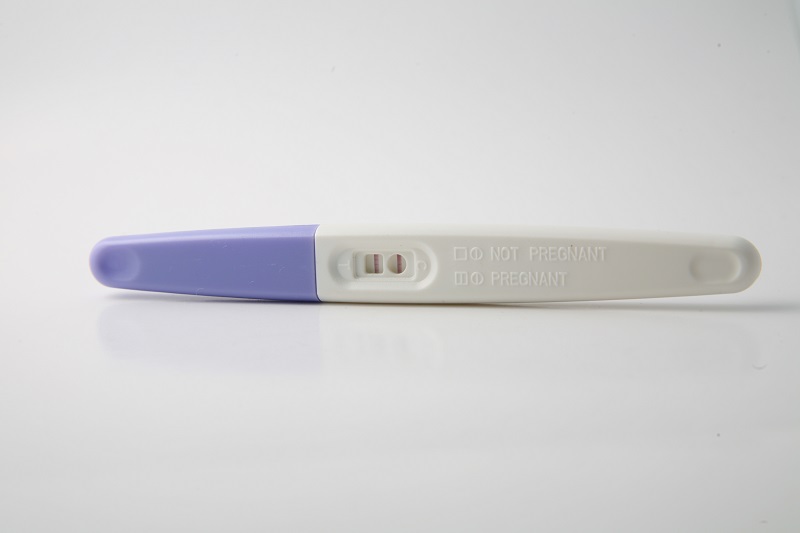
A pregnancy in its most fundamental function is a method for attempting to identify whether or not a woman is pregnant. When it comes to the many approaches and tools for pregnancy tests here in the Philippines, there is a number of indicative markers that are seeped from urine and blood. Pregnancy tests essentially require a sample from one of these two substances.
The first discovered mark in determining whether or not a woman is pregnant is human chronic gonadotropin or HCG, which was well-established in 1930 and is found to be produced by the fertilized ova or egg’s syncytiotrophoblast cells.
Although human chronic gonadotropin or HCG is quite the accurate marker for identifying pregnancy results, it is incapable of being detected until after the implantation. This basically results in the possibility of false negatives if the test is performed during the earlier stages of pregnancy. HCG can be found in blood samples 8 days after the fertilization of the egg has occurred and in the urine sample 10 days after.
Obstetric ultrasonography is another alternative utilized in detecting pregnancy results. This method was first applied and practiced in the 1960s, and in 1968, served as the first home test kit for HCG. This tool was released in the markets during the mid-1970 initially all across the United States and the United Kingdom.
Since then, pregnancy tests here in the Philippines and all across the globe have been designed to easily identify if your blood or urine contains the human chronic gonadotropin or HCG hormone. In this day and age, there are basically two main types of pregnancy testing tools:
- Urine Tests – This common type of pregnancy test can either be conducted in a doctor’s office or simply at home. Relatively speaking, many women first go with a home pregnancy test after roughly a week of missing a period. This is mainly due to the fact that home pregnancy tests are practical, convenient, and private.
There are many products that come with easy-to-follow instructions. You need to follow them closely in order to assure that you receive the most accurate results. After the simple testing process, you are able to completely confirm the results by setting an appointment with a doctor, who can then conduct more thorough testing.
- Blood Tests – Generally speaking, this type of pregnancy test can solely be done at a doctor’s office and under professional control. Blood tests can identify pregnancy at an earlier rate than that of home pregnancy testing, at approximately 6 to 8 days after the ovulation.
Signs You Should Take a Pregnancy Test

When it comes to pregnancy tests here in the Philippines and all around the world, there are many pre-emptive measures and protocols that you have to acquaint yourself with prior to just jumping into the process. You should always wait to take a pregnancy test until a week has passed after you have missed your period in order to get the most infallible results. If you refuse to wait until you have missed your period, you should at least wait for about 1 to 2 weeks after you’ve engaged in sexual intercourse. This is mainly due to the fact that if ever you are pregnant, your body requires a certain amount of time as to develop identifiable levels of HCG, which takes around 7 to 12 days after the successful fertilization or implantation of an egg.
There is a high possibility that you may receive inaccurate results if you decide to take a home pregnancy test here in the Philippines too early.
Let’s take a good look at some of the key signs that indicate you should take a pregnancy test:
You Have Missed Your Period
The first and most reliable sign of pregnancy is missing your period. If you fail to keep close track of your cycle, it can definitely be quite difficult to determine whether or not you are late in your menstrual cycle. Most women have a 28-day menstrual cycle. You may want to ideally consider taking a home pregnancy test here in the Philippines if it has already been more than a month since your last period.
Keep in mind that your period can sometimes skip or be delayed as the result of your exercise, diet, stress, overall lifestyle, or certain medical conditions.
You should also pay attention to the flow of menstrual blood if you are beginning to suspect that you are pregnant. It is very common to experience light spotting or light bleeding in the early weeks as the egg begins to bury deeper into the uterine lining during implantation or fertilization. You must make sure to take note of significant differences in the amount, texture, and color of your blood.
You Are Experiencing Cramps
Fertilization or implantation can also produce painful sensations that are similar to those of menstrual cramps. In the early stages of pregnancy, you may feel this type of general discomfort and instinctively feel as though your period is about to occur, but it never arrives.
If you experience something like this, you may need to take a pregnancy test because hormone levels vary by pregnancy and with every woman.
Feeling Pain in Your Breasts
Pregnancy creates more amounts of estrogen and progesterone in your body, and these hormones begin to make distinctive changes in your body in order to adapt and support the baby’s growth.
You may feel as though your breasts start to feel more tender and begin looking bigger because of your body’s increased blood flow. Another sign that falls with this is that your nipples also start to feel pain along with the veins appearing darker under the skin.
Due to the fact that most women also feel a certain discomfort in their breasts in the days that lead up to their period, this type of symptom is not always an accurate indication of pregnancy.
When You Are Feeling ‘Different’
Besides sore breasts and the experience of cramps, what this section refers to is the occurrence of:
- Food aversions
- Frequent urination
- Constant exhaustion
- Nausea
As the weeks go by, these symptoms you may feel these symptoms to keep getting stronger before your HCG levels start to even out in the later dates of your first trimester. You know your body better and what it truly feels better than anybody else, so it is imperative that you pay attention to it.
Any experience of unusual physical symptoms that fall under the same strain with the ones mentioned above could be an indicator that you should take a pregnancy test.
Contraception Failure
Contraceptive devices such as condoms and birth control pills do not provide a complete 100% assured protection from fertilization and pregnancy. In plain and simple terms, despite the application of a contraceptive measure, there will always be a slight and open chance that you can still get pregnant—regardless of how careful and calculated you are.
Aside from incorrect usage, condoms have a possibility of tearing or breaking. According to statistical data from Planned Parenthood, around 18 out of 100 women who prefer their partners to use condoms during sexual intercourse get pregnant each year.
Taking birth control pills can be quite difficult to keep track of, errors and contraceptive defects can result in unplanned pregnancy. According to the statistics of Planned Parenthood, 9 out of 100 women who take birth control pills will get pregnant if they do not take the pills as directed.
Types of Home Pregnancy Tests

Receiving a professional consultation from a certified doctor is ideal and recommended for women who may be pregnant as to secure their health and as well as that of the possible child that they may be carrying. There is a wide selection of easily accessible and purchasable home pregnancy test here in the Philippines, however, there are several reasons as to why a woman might not want to utilize these methods or seek out the services of a medical practitioner:
- The professional services and applications of a pharmacy or doctor may be too expensive.
- It may be too difficult to schedule a doctor’s appointment or a pharmacy may not immediately be accessible for you.
- The possibility of pregnancy may be a matter of secrecy.
- You may want to be an advocate of natural approaches to childbirth and wish to avoid clinical measures.
- You may not be able to handle the anxiety that comes with waiting for a clinical or over-the-counter test.
Fortunately, there are quite a few reliable methods of DIY home pregnancy tests here in the Philippines that can easily be conducted with everyday ingredients that you have at home. Although these measures may not be completely accurate, they may serve as good starting points.
Bleach Pregnancy Test
Household bleach is a substance that is readily available in virtually every home that uses a laundry system. Besides serving as an active ingredient for whitening your clothes, this inexpensive item can also be used in determining whether or not you are pregnant.
By pouring a portion of bleach into a container and adding a sample of your urine, you can observe the mixture and if it fizzles and foams, it is a good indicator that you may be pregnant.
Sugar Pregnancy Test
Sugar is another ubiquitous household commodity that can be found in almost every kitchen. By pouring several spoonsful of sugar into a bowl and adding your urine into it, or simply urinating directly onto sugar, the result can be a good indicator that you may be pregnant.
In this case, you are looking out for the formation of sugar clumps: if the sugar appears to form clumps, it is a sign that there is a good chance that you are pregnant. If the sugar, simply dissolves into the liquid then you are less likely not pregnant.
Toothpaste Pregnancy Test
With this method, it is necessary that you utilize a toothpaste that is simple and plain white. Again, you are going to have to urinate directly or mix your urine with the toothpaste. If the toothpaste turns light blue in color, or if it begins to foam and froth, this is a sign that you may be pregnant.
How to Avoid False Positive and False Negative Results
If you choose to go with an over-the-counter home pregnancy test here in the Philippines, there is always a chance that the result may not be accurate; they may be either false positive or false negative.
Let’s take a look at the most common causes for false results:
Causes for False Positive Results
- Luteinizing Hormone Peak – HCG can be released from the pituitary gland during the time of your LH Peak. Taking a pregnancy test during this period opens the possibility of a false positive result.
- Chemical Pregnancy – Many early pregnancies are miscarried even before the day of your period. Taking a test too early could identify an early pregnancy that may not be viable.
- Perimenopause – These women have higher levels of HCG, even when they are not pregnant.
- Infertility Treatment – Women who are undergoing HCG treatment for ovulation stimulation may be detected with false positive results if testes within 10 days of the last injection.
Causes for False Negative Results
- Early Testing – During early pregnancy, many women fail to produce enough HCG for the test to detect.
- Insufficiently Sensitive Testing – Early testing ideally requires a more sensitive test.
- Diluted Urine – Increased urine volume may possibly make HCG too diluted for measuring.
- Late Testing – Urine samples that have not been tested for approximately 30 minutes or more may lead to false negative results.
Pregnancy Tests in the Philippines with The Generics Pharmacy
The Generics Pharmacy is a company that focuses on providing Filipinos with affordable alternatives in quality medicine (for headaches and fever, diabetes, cough and cold, etc.). We have revolutionized the entirety of the country’s pharmaceutical healthcare industry and retail with our bold paths for growth. When it comes to pregnancy test here in the Philippines, we provide only top quality products that ensure both accuracy and convenience.
Click here for more information on how The Generics Pharmacy can help with your pregnancy testing needs.
Also, here’s the list of our drugstores in the Philippines!